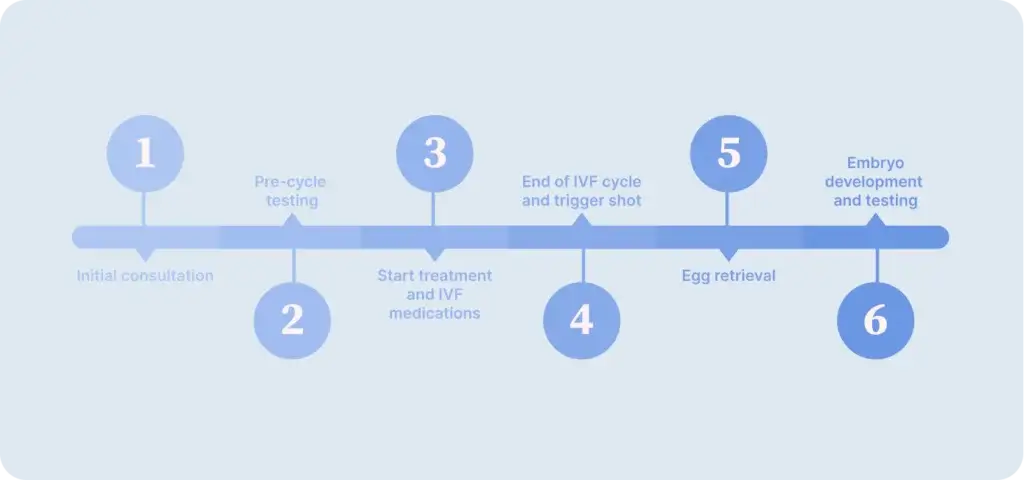
Key Takeaways:
1. Initial Consultation
Your IVF journey begins with a consultation with a reproductive endocrinologist—a fertility specialist. During this meeting, our physician will review your:
Tip: It’s helpful to prepare by gathering personal and family medical information before your consultation. RPSD has a ‘Fast Track program‘ created for patients who would like to move forward with their Intrauterine Insemination (IUI) or In Vitro Fertilization (IVF) treatment plan as soon as possible and make the most of their initial consultation.
After this discussion, your physician will conduct an evaluation, which typically includes a transvaginal ultrasound, checking vital signs and weight, and ensuring your lab work is current. These results help the us design a personalized treatment plan.
Note: All ultrasounds are performed by our double board-certified physicians.
Join Dr. Jamie Stanhiser from Reproductive Partners Fertility Center San Diego (RPSD) as she shares essential tips and insights on how to prepare for your IVF journey. From understanding the process to making lifestyle adjustments, Dr. Stanhiser covers everything you need to know to increase your chances of success.
How does payment work?
After the consultation, you’ll meet with the financial team to discuss payment options and explore insurance coverage. They’ll also assist with pharmacy coordination based on your insurance plan.
Join us as we break down the essentials of fertility insurance coverage and how it works at RPSD. Learn about what is typically covered, tips for working with your insurance provider, and how we support you throughout the process.
2. Pre-cycle Testing
Before starting IVF, you may need additional tests, such as:
These tests help the doctor assess your uterus and fallopian tubes for issues like fibroids, polyps, or blockages that could affect fertility.

3. Starting Treatment and IVF Medications
Treatment officially begins on Cycle Day 2 or 3 (the second or third day of your period). At this first appointment, the physician will:
If your results are favorable, your doctor will provide instructions for administering IVF medications and schedule your next appointments.
What if a cyst or elevated estrogen is detected?
If there’s a dominant follicle, ovarian cyst, or high estrogen levels, your doctor may advise waiting another month before starting treatment to allow your body to reset. Adjustments to your medication plan may also be necessary.
IVF Medications:
IVF medications are typically administered through subcutaneous injections (into the belly or upper thigh). These injections stimulate egg development and are taken nightly for about 10 to 14 days, though timing can vary.
During this phase, you’ll visit the clinic 5-7 times to monitor your response to medication, especially as egg retrieval approaches. Flexibility is key—appointments are scheduled based on how your body is responding to treatment.
How will the medication affect me?
Expect some bloating as your ovaries respond to stimulation. Reducing exercise from Day 6 of your medication cycle is recommended to avoid discomfort. Staying hydrated with fluids and electrolytes can help manage symptoms.
4. Trigger Shots and Final Preparations
When your follicles reach the right size, your doctor will instruct you to administer a trigger shot (commonly HCG) to prepare for egg retrieval.
How the trigger shot works:
Following the trigger shot, you’ll receive instructions for your upcoming egg retrieval appointment.
5. Egg Retrieval Procedure
Egg retrieval is a minor outpatient procedure performed under mild IV anesthesia. You’ll be asleep but breathing on your own throughout the 15-minute procedure, during which the doctor uses ultrasound guidance to collect eggs from your ovaries.
Afterward, you’ll spend a few hours recovering at the clinic before heading home.
Tip: Take the day off to rest and allow the anesthesia to wear off. If you’re feeling well, you can return to work the following day.
6. Embryo Development, Testing, and Storage
After retrieval, your eggs will be fertilized using either:
The embryologist will place the eggs and sperm in a petri dish to encourage fertilization, or they may use intracytoplasmic sperm injection (ICSI) if recommended.
The resulting embryos are cultured in the lab for up to seven days, growing to a mature state called a blastocyst. At this stage, some cells can be removed for preimplantation genetic testing (PGT), and the embryos are frozen for future use.
Timing is everything when it comes to embryo transfers. At RPSD, we aim to optimize the conditions for success, ensuring that your body is ready to welcome a new beginning.
What is PGT?
PGT is an optional test that checks the chromosomes of the embryos to identify any abnormalities. Choosing chromosomally normal embryos increases the chances of a successful pregnancy. Your doctor will help you decide whether PGT is the right option for you.
Once frozen, your embryos will remain safely stored until you are ready for the embryo transfer. Your physician will coordinate with you to schedule the transfer based on your preferred timeline.
Click here to learn more about fresh and frozen embryo transfers.
Ready to speak to an RPSD physician? Schedule Your Appointment!
Our skilled fertility specialists are here to help. Contact us today and let’s discuss the next phase of your fertility journey.